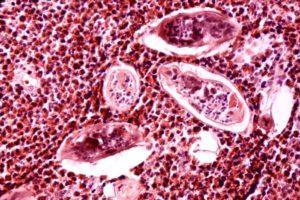
Histopathology of schistosomiasis haematobia, bladder. Public Health Image Library, NIAID, Image ID:35)
Previous studies have suggested that women who are chronically infected with schistosomiasis have increased HIV infection rates. However, prior to this current study, there were no longitudinal studies following individuals with schistosomiasis overtime to see whether the infection increased HIV acquisition risk. Researchers, led by Daniel W. Fitzgerald, found that being infected with schistosomiasis increased the odds of HIV infection in women but not in men. They found that HIV-infected individuals with schistosomiasis had higher viral loads, highlighting a role for the parasite in not only HIV acquisition but potentially in HIV pathogenesis.
Schistosomiasis is highly prevalent in Africa, with approximately 218 million people being affected worldwide; 90% of infections occurring in Africa. The disease is caused by a parasitic worm which infects the pelvic and gastrointestinal venules of the host. The eggs of these worms migrate to the urogenital and gastrointestinal mucosa which results in inflammation. This inflammatory responses has been suggested to alter the susceptibility of the host to HIV and also affect the immune responses towards the virus after infection.
The team of researchers had two hypotheses. First, they believed that schistosomiasis infection would increase the risk of HIV infection and that this effect was different between men and women. The team also hypothesized that individuals with schistosomiasis had dysfunctional immune response towards HIV which would result in higher viral loads at seroconversion.
The researchers conducted a nested case-control study in Tanzania. They obtained dried blood spots from individuals who were tested for HIV in 2007, 2010 and 2013. Upon analysis of the blood spots from the different years, they found that women with schistosomiasis had higher odds of contracting HIV as opposed to uninfected women whilst schistosomiasis did not affect the odds for men. Individuals with schistosomiasis who became infected with HIV had significantly higher viral loads upon seroconversion as compared to those with schistosomiasis.
This study suggests that schistosomiasis may contribute to HIV acquisition and pathogenesis. Treatment of the parasitic worm may aid in reducing HIV incidence in highly endemic areas.
Article by Thandeka Moyo













